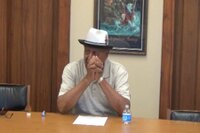| Title |
McQueen, Joe OH12_035 |
| Creator |
Weber State University, Stewart Library: Oral History Program |
| Contributors |
McQueen, Joe, Interviewee; Langsdon, Sarah, Interviewer; Gallagher, Stacie, Technician |
| Collection Name |
Business at the Crossroads-Ogden City Oral Histories |
| Description |
Business at the Crossroads - Ogden City is a project to collect oral histories related to changes in the Ogden business district since World War II. From the 1870s to World War II, Ogden was a major railroad town, with nine rail systems. With both east-west and north-south rail lines, business and commercial houses flourished as Ogden became a shipping and commerce hub. |
| Abstract |
The following includes the transcript and a video clip from an oral history interview with Joe L. McQueen, jazz saxophonist. |
| Image Captions |
Joe L. McQueen |
| Subject |
Jazz; Musicians; Race discrimination |
| Digital Publisher |
Stewart Library, Weber State University, Ogden, Utah, USA |
| Date |
2013 |
| Date Digital |
2015 |
| Temporal Coverage |
1919; 1920; 1921; 1922; 1923; 1924; 1925; 1926; 1927; 1928; 1929; 1930; 1931; 1932; 1933; 1934; 1935; 1936; 1937; 1938; 1939; 1940; 1941; 1942; 1943; 1944; 1945; 1946; 1947; 1948; 1949; 1950; 1951; 1952; 1953; 1954; 1955; 1956; 1957; 1958; 1959; 1960; 1961; 1962; 1963; 1964; 1965; 1966; 1967; 1968; 1969; 1970; 1971; 1972; 1973; 1974; 1975; 1976; 1977; 1978; 1979; 1980; 1981; 1982; 1983; 1984; 1985; 1986; 1987; 1988; 1989; 1990; 1991; 1992; 1993; 1994; 1995; 1996; 1997; 1998; 1999; 2000; 2001; 2002; 2003; 2004; 2005; 2006; 2007; 2008; 2009; 2010; 2011; 2012; 2013 |
| Item Size |
39p.; 29cm.; 2 bound transcripts; 4 file folders. 1 video disc: digital; 4 3/4 in. |
| Medium |
oral histories (literary genre) |
| Spatial Coverage |
Ogden (Utah); 25th Street (Utah) |
| Type |
Text; Image/MovingImage |
| Conversion Specifications |
Filmed using a Sony HDR-CX430V digital video camera. Sound was recorded with a Sony ECM-AW3(T) bluetooth microphone. Transcribed using WAVpedal 5 Copyrighted by The Programmers' Consortium Inc. Digitally reformatted using Adobe Acrobat Xl Pro. |
| Language |
eng |
| Rights |
Materials may be used for non-profit and educational purposes, please credit University Archives, Stewart Library; Weber State University. |
| Source |
McQueen, Joe OH12_035; Weber State University, Stewart Library, University Archives |
| Format |
application/pdf; video/mp4 |
| ARK |
ark:/87278/s61amq34 |
| Setname |
wsu_webda_oh |
| ID |
104148 |
| Reference URL |
https://digital.weber.edu/ark:/87278/s61amq34 |
| Title |
McQueen, Joe OH12_035 |
| Creator |
Weber State University, Stewart Library: Oral History Program |
| Contributors |
McQueen, Joe, Interviewee; Langsdon, Sarah, Interviewer; Gallagher, Stacie, Technician |
| Description |
Business at the Crossroads - Ogden City is a project to collect oral histories related to changes in the Ogden business district since World War II. From the 1870s to World War II, Ogden was a major railroad town, with nine rail systems. With both east-west and north-south rail lines, business and commercial houses flourished as Ogden became a shipping and commerce hub. |
| Image Captions |
Joe L. McQueen |
| Biographical/Historical Note |
The following is an oral history interview with jazz saxophonist Joe L. McQueen, conducted by Sarah Langsdon on July 25, 2013 at the Stewart Library. McQueen discusses his experiences with 25th Street, jazz musicians, and segregation. He describes receiving a deferment during World War II to play music, starting the Porters and Waiters Club with the Weakleys, and his work on the railroad. |
| Subject |
Ogden (Utah); 25th Street (Utah); Jazz; Jazz musicians--1930-1950; Segregation |
| Digital Publisher |
Stewart Library, Weber State University, Ogden, Utah, USA |
| Date |
2013 |
| Date Digital |
2015 |
| Temporal Coverage |
1919-2013 |
| Item Size |
39p.; 29cm.; 2 bound transcripts; 4 file folders. 1 video disc: digital; 4 3/4 in. |
| Medium |
oral histories (literary genre) |
| Spatial Coverage |
Ogden (Utah); 25th Street (Utah) |
| Type |
Text |
| Conversion Specifications |
Filmed using a Sony HDR-CX430V digital video camera. Sound was recorded with a Sony ECM-AW3(T) bluetooth microphone. Transcribed using WAVpedal 5 Copyrighted by The Programmers' Consortium Inc. Digitally reformatted using Adobe Acrobat Xl Pro. |
| Language |
eng |
| Rights |
Materials may be used for non-profit and educational purposes, please credit University Archives, Stewart Library; Weber State University. |
| Source |
McQueen, Joe OH12_035; Weber State University, Stewart Library, University Archives |
| Format |
application/pdf |
| Setname |
wsu_webda_oh |
| ID |
104367 |
| Reference URL |
https://digital.weber.edu/ark:/87278/s61amq34/104367 |





